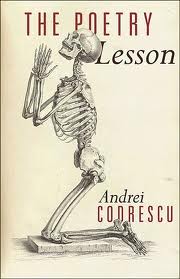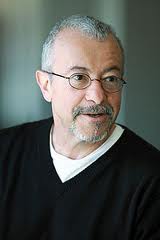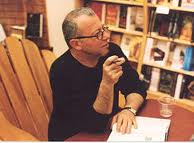Maybe the reason why Andrei Codrescu has taught literature and creative writing at LSU for twenty-five years is that there are no corporate job descriptions calling for anarchists with proven skills in Dadaism. Now 64, Codrescu looks back fondly on the days when people at parties had sex in bathrooms with broken locks, just as I reflect on times when public relations specialists did the same in the empty and supposedly locked company auditorium. The anarchists have come in from the cold.
 In The Poetry Lesson, we find Professor Codrescu in his “last semester of spreading the impossible affliction of poetry” to twelve students in their first three-hour session of Introduction to Poetry. Each student gets to pick a “Ghost Companion” – a poet to study and stalk. A Ms. Helmick, for instance, must choose between Heine, Hejinian, Holbein, Hikmet or Holub. As poets’ names are plucked from the hat, Codrescu often digresses to gab about Burroughs, Ferlinghetti, Rimbaud, Aimé Césaire, Henry Michaux, Max Jacob, Paul Blackburn, or his own GC, Ted Berrigan. Maintaining that the first duty of the memoirist is “to place him/herself at the center of historical things,” he builds an anecdotal perspective of his own era, sometimes reaching further back to make a point about the legacy of poetry. There is “no longer any street theater on campus or in the city” and the old stories no longer have the power to scandalize, but it is fun listening to Codrescu try anyway. Mainly he is melancholy and snippy: “The poets went indoors like sheep to compete for time with standup comedians. I headed for my own performance space: the office. A forlorn sanctum: I kept few office hours.”
In The Poetry Lesson, we find Professor Codrescu in his “last semester of spreading the impossible affliction of poetry” to twelve students in their first three-hour session of Introduction to Poetry. Each student gets to pick a “Ghost Companion” – a poet to study and stalk. A Ms. Helmick, for instance, must choose between Heine, Hejinian, Holbein, Hikmet or Holub. As poets’ names are plucked from the hat, Codrescu often digresses to gab about Burroughs, Ferlinghetti, Rimbaud, Aimé Césaire, Henry Michaux, Max Jacob, Paul Blackburn, or his own GC, Ted Berrigan. Maintaining that the first duty of the memoirist is “to place him/herself at the center of historical things,” he builds an anecdotal perspective of his own era, sometimes reaching further back to make a point about the legacy of poetry. There is “no longer any street theater on campus or in the city” and the old stories no longer have the power to scandalize, but it is fun listening to Codrescu try anyway. Mainly he is melancholy and snippy: “The poets went indoors like sheep to compete for time with standup comedians. I headed for my own performance space: the office. A forlorn sanctum: I kept few office hours.”
Codrescu told Mark Spitzer in an interview posted on Facebook that he wrote this book in the hours after teaching his undergraduate poetry seminar:
“I shouldn’t even call it ‘teaching poetry’ because it was mostly playing and instructing students in the poetic mode, in thinking poetically, and even living that way if they had strong livers. I used some composite of youths of the 21st century and wrote without fear of digression because I would inevitably return to class the next week and come back to my characters. So, it’s a lived piece of reportage, in one sense, an autobiographical invention on the other, and a meditation on poetry scenes that had a bearing on the ‘lesson.’ Writing this it occurred to me just how boring ‘teaching creative writing’ is these days, and how many unimaginative drones who were themselves ‘taught’ by unimaginative drones are fouling the air in our institutions of so-called ‘higher’ learning. Most teacher-poets of the last four decades in America were dull bastards who nearly destroyed the art. Maybe they did.”
 You could say Codrescu is just biting the hand that has fed him except that having no prejudices or constraints he will snap at anything with fingers. His target is humanity. It just so happens that the humans among whom he has often dwelled are academics. On the floor above his seminar room, “tenured professors tapped steadily on their keyboards, completely uninterested in the deep ravine that ran between their professional thoughts and their lives.” Again, I recall my corporate colleagues. It’s all one world. My only surprise is that Codrescu still differentiates between “professional thoughts” and “their lives.” I thought the “fin-de-siècle salaried beatnik”[s] (as he describes himself) had done away with the inner man.
You could say Codrescu is just biting the hand that has fed him except that having no prejudices or constraints he will snap at anything with fingers. His target is humanity. It just so happens that the humans among whom he has often dwelled are academics. On the floor above his seminar room, “tenured professors tapped steadily on their keyboards, completely uninterested in the deep ravine that ran between their professional thoughts and their lives.” Again, I recall my corporate colleagues. It’s all one world. My only surprise is that Codrescu still differentiates between “professional thoughts” and “their lives.” I thought the “fin-de-siècle salaried beatnik”[s] (as he describes himself) had done away with the inner man.
Codrescu has a response to that wearisome question “Can poetry writing be taught?” He says, “Unfortunately, poetry was exceedingly teachable. One reached for the end of any thread in the tangled ball of yarn of what we know and pulled: the thing unraveled and that was poetry.” The twelve students learn no lesson per se in The Poetry Lesson except for the persistence of poetry itself (so many poets behaving so strangely, desperately, exuberantly, sadly), the unpredictability of their professor’s behavior and odd techniques, and the meager but still evident chance of connecting with each other through verse. They attend to fulfill a requirement. But we attend for comically inspired refreshment and some laughs.
Meanwhile, Codrescu proceeds headlong in an altogether entertaining “pedagogical-memorialistic mode.” He describes his teaching assignment: “Intro to Poetry Writing is always like this: a long labor, a breech birth, or, obversely, mining in the dark. You take healthy young Americans used to sunshine (aided sometimes by Xanax and Adderall), you blindfold them and lead them by the hand into a labyrinth made form bones. Then you tell them their assignment: ‘Find the Grail. You have a New York minute to get it.’” But The Poetry Lesson isn’t just a string of zingers. Codrescu goes on in this case to talk about the “thirty-year childhood” of Americans and the four suicidal people he has known (only one successful). Ultimately, this book is about Codrescu’s prickly narrative voice and the delight he takes in blabbing. It’s a voice confident in its charming idiosyncrasies, spicier than his NPR pieces.
 Codrescu everywhere sees a cheapening of experience and a weakening of awareness. “In every American city of the twenty-first century there was now a hole-in-the-wall where disaffected and affluent youth sat between walls festooned with sickles-and-hammers, wearing Che Guevara™ tees, drinking mojitos and doing drugs in the unisex bathrooms. Who Karl Marx was they didn’t know … Wherever they looked they saw themselves reflected, their faces so young, pretty, in the hard red and black mirror of symbols empty of ideology.”
Codrescu everywhere sees a cheapening of experience and a weakening of awareness. “In every American city of the twenty-first century there was now a hole-in-the-wall where disaffected and affluent youth sat between walls festooned with sickles-and-hammers, wearing Che Guevara™ tees, drinking mojitos and doing drugs in the unisex bathrooms. Who Karl Marx was they didn’t know … Wherever they looked they saw themselves reflected, their faces so young, pretty, in the hard red and black mirror of symbols empty of ideology.”
The Poetry Lesson is Codrescu’s farewell to the Department of English and the Deans of this and that, a spillage in response to conditions he cranked about in the Spitzer interview (below):
“School administrations take a dim view of honesty. It’s the one thing, besides integrity, that isn’t allowed by this august institution. Telling children the truth is tantamount to treason: they would send you to Guantanamo if they could. As it is, they just deny you tenure. If you don’t want to fake it, you just keep your mouth shut, you don’t publish it. I’ve had tenure for a long time, but I wasn’t ready to write about my students because I was too busy, and I didn’t really care about having to explain to some square in a golf jersey that his wife was fucking one of my grad students. I once broadcast a mild commentary on NPR about just how ignorant my students were of real-world issues, and you think that I’d blown up the ROTC building. They went ballistic. Two decades ago you could still get away with a radical rant, for instance, but these days they’ll turn you in to Homeland Security. In the 90s I used to give a poetry assignment: Write a poem you can be arrested for! But in 2010, they’d take me out in handcuffs if I did that.”
No, that’s the problem for graying anarchists – they don’t arrest poets and other vagrants like they used to in San Francisco or Paris or Bucharest. For that kind of treatment, go to Harare or Nablus or Teheran.
As Ms. Helmick is assigned Miroslav Holub, we all get an earful about the ex-pats who flocked to Prague after the Velvet Revolution. There Codrescu looked out his window and saw a woman who squatted and “peed heartily on the medieval cobblestones of the empty square where people had been hanged, revolutions unfolded, and national holidays celebrated.” Lingering on the seminar room, The Poetry Lesson longs to be a book of the body – the bodies of students who remind Codrescu of former girlfriends, the bladders of seminarians filling during his mini-lectures, the memory of bodies, and the anarchic poet’s aging body feeling its still desirous pulse.
[Published by Princeton University Press on October 20, 2010. 128 pages, $19.95 hardcover]
Andrei’s Antics
The spirit of your review coexists very well with Codrescu’s spirit. He pisses on academia, then gets Princeton U to publish his book. Subversive or compromised? Maybe one of his points is that the question doesn’t seem to interest anyone anymore. All I can tell you is that when I hear his accented rap on NPR I turn up the volume. They should get you to talk about books on NPR.
He’s on target
I’m an untenured teacher who agrees with everything Codrescu says about the academy. There are many teachers who won’t or can’t engage with kids about the issues that matter to them or about the daily questions about living that underlie the humanities. But I admit that i like watching the kids wander around trying to glean whatever they can from whomever is willing. The untenured teachers are keeping their heads down and hoping nothing crashes on them. The department head is a capo. They might not send me to Guantanamo if I say something provocative but they will give me the goodbye look.
On The Body Of The Poetry Lesson
“No, that’s the problem for graying anarchists – they don’t arrest poets and other vagrants like they used to in San Francisco or Paris or Bucharest. For that kind of treatment, go to Harare or Nablus or Teheran.”
Now why did that raise a local smile? Thank you very much for another inspired, and inspirational, review.
I suppose that the novel, the memoir or rant, are all joined here in Mr Codrescu’s book. We are invited to spend time imagining how privileged we would be to have assigned to us, in a poetry class, our own invited responses. (My surname begins with ‘S’ so I’d be in good company.)
Me, I’m a little tired of hearing about how little interest there really is in poetry.
But nobody really lacks imagination. Whether in the corporate auditorium or in the safe semi-bearded anarchy of the academy. That we think young minds need prodding into “a poem [they] can be arrested for” is a pity.
Why do I feel that most poetry comes out of a clandestine factory?
The problem, if there really is one, isn’t that there isn’t enough poetry in the world, but it is the manner of its production. There’s always been a great deal of it out there, and no one can keep track. In the demotic every-bloody-day, many people are aware of their speech rhythms, their diction, the sound and sway of the meaning of their lives.
We don’t intend to limit poetry to the page, or to the book, do we?
I don’t know why I expatiate so. Except that I think it might be going the wrong way.
How little can you appropriate from your sense of what you need? How much will you eventually say?
Do we pour concrete around our hearts? It still beats. The anarchists have indeed come in from the cold, grateful that their thumbs still work.